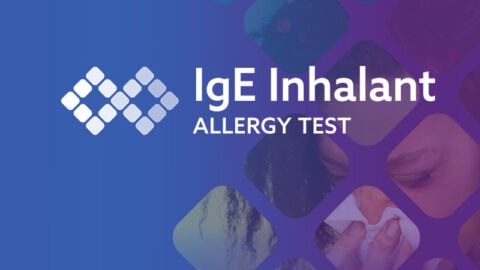Details
Understanding IgE Reactions
IgE antibodies prompt the release of histamine and the activation of mast cells, causing the classic allergic response. Serum IgE tests can measure IgE antibody levels in the blood. Allergic reactions occur when IgE antibodies attach to specific receptors on mast cells and other white blood cells. Elevated IgE antibody levels indicate that the patient is likely to experience physiological effects from consuming foods or inhaling environmental allergens to which they are sensitive.
Although IgE is typically present in small amounts, the risk of severe reactions is thought to increase as the amount of IgE increases. Genetics are believed to play a role in the development of allergies. Exposure to microbes, various foods, and environmental allergens can also elicit an IgE response.
It is important to note that having measurable IgE for a particular allergen does not necessarily mean that you will experience allergy symptoms when exposed to it. While higher IgE levels generally increase the likelihood of having a true allergy, they do not predict the severity of allergic symptoms.
Why Test IgE Antibodies?
Eliminating foods that trigger IgE reactions can alleviate symptoms and related disorders. Our IgE antibody testing identifies specific trigger foods by measuring heightened levels of IgE antibodies associated with them. IgE testing assists health practitioners in developing personalized treatments for their patients as IgE responses may not always be immediately recognizable, making accurate testing an important complement to patient symptom reporting.
Learn More About IgE Food Allergy Tests: Explore FAQs
Analytes
The MosaicDX IgE Food Allergy Test analyzes the most common foods that produce IgE reactions. Our testing includes both the basic and advanced panels to help identify the specific trigger foods and develop personalize care.
Click the below for insight into common foods tested under each panel:
Almond
Apple
Barley
Beef
Cacao
Carrot
Chicken
Egg (Whole)
Garlic
Green Bean
Maize, Corn
Milk (Cow’s)
Oat
Onion
Orange
Peanut
Pork
Potato
Rice
Shrimp
Soybean
Tomato
Tuna
Wheat
White Bean
Yeast (Bakers/Brewers)
Almond
Apple
Apricot
Asparagus
Aubergine, Eggplant
Avocado
Banana
Barley
Beef
Blueberry
Brazil Nut
Broccoli
Buckwheat
Cabbage
Cacao
Carrot
Cashew Nut
Celery
Cheese, Cheddar Type
Cheese, Mold Type
Cherry
Chick Pea
Chicken
Coconut
Coffee
Cow’s Milk Whey
Crab
Cranberry
Cucumber
Egg White
Egg Yolk
Fish (Cod)
Foxtail Millet
Garlic
Gluten (Wheat)
Goat Milk
Grape
Grapefruit
Green Bean
Halibut
Hazelnut
Lemon
Lentil
Lettuce
Lima Bean
Linseed
Lobster
Maize, Corn
Mango
Milk (Boiled)
Milk (Cow’s)
Mushroom (Champignon)
Mustard
Mutton
nBos d 8, Milk
(Casein Component of Milk)
Oat
Olive
Onion
Orange
Papaya
Paprika, Sweet Pepper
Pea
Peach
Peanut
Pear
Pecan Nut
Pineapple
Pistachio
Plum
Pork
Potato
Pumpkin
Red Kidney Bean
Rice
Rye
Salmon
Sardine, Pilchard
Sesame Seed
Shrimp
Soybean
Spinach
Strawberry
Sunflower Seed
Sweet Potato
Tomato
Tuna
Turkey Meat
Walnut
Watermelon
Wheat
White Bean
Yeast (Bakers/Brewers)
Sample Reports
The IgE Food Allergy test reports are useful resources for practitioners who want to gain valuable insights into the underlying causes of IgE reactions.
This test report groups the markers on the IgE Food Allergy test into the following clinically important groups:
- Dairy
- Legumes
- Fruit
- Grains
- Fish/Seafood
- Meat
- Nuts and Seeds
- Vegetables
- Miscellaneous
Test Prep and Instructions
MosaicDX offers patient-friendly sample collection kits that simplify testing. Our kits include visual, step-by-step instructions for test preparation and sample collection, personalized shipping cards, and pediatric collection bags if needed. With MosaicDX, patients can easily collect samples for testing with confidence and accuracy.
Patient Resources
Allergic reactions such as hives, rashes, swelling, and allergic rhinitis are widely recognized by most people. The intensity of human reactions to food antigens can vary greatly, with some reactions being dangerous and leading to anaphylaxis.
Symptoms and conditions typically associated with IgE allergies may include:
- Asthma
- Atopic disease
- Rhinitis
- Conjunctivitis
- Nausea, vomiting, diarrhea, abdominal pain
- Rash, hives
- Localized swelling
- Anaphylaxis
- ADHD
- Acne, Eczema, Rashes
- Anxiety
- Autism Spectrum Disorders
- Candidiasis
- Chronic Fatigue
- Chronic Infections
- Depression
- Fibromyalgia
- IBS
- Leaky Gut Syndrome
- Migraines
- Movement Disorders
- Multiple Sclerosis
- OCD
- Rheumatoid Arthritis Seizures
- Tic Disorders / Tourette’s Syndrome











